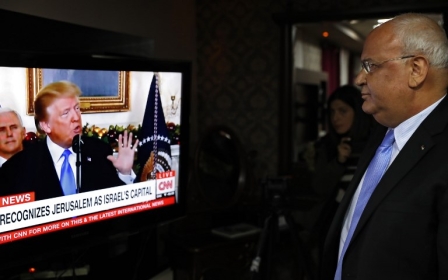Saudi, UAE, Egypt, Jordan back Trump’s Israel-Palestine plan: Report

Four Arab countries are backing Donald Trump’s plan for a settlement between Israel and the Palestinian Authority, according to an Israeli newspaper, and are willing to sideline the PA’s President Mahmoud Abbas to see it done.
According to a report in Israel Hayom, Saudi Arabia, the United Arab Emirates, Egypt and Jordan told Jared Kushner, the US president's son-in-law and the man charged with solving the Israel-Palestine issue, and envoy Jason Greenblatt they were behind Washington’s so-called “deal of the century”.
Israel Hayom, a daily newspaper owned by billionaires Miriam and Sheldon Adelson, reported that it spoke to officials from the four Arab countries.
The officials are said to have told the paper that their countries have decided to back the US plan regardless of whether Abbas and the PA engage with it.
In the report, a “top Egyptian official” says the countries are unanimous in their position that were the US to go over Abbas’ head and attempt to implement the settlement plan, they would not be opposed to it.
Since taking the presidency, Trump has often framed himself as the man to finally negotiate an end to the Israel-Palestine conflict.
However, in recognising Jerusalem as Israel’s capital, he has been accused by Abbas and the PA of clearly favouring the Israelis and therefore excluding the US from the role of honest dealmaker.
The Palestinians seek East Jerusalem, occupied by Israel since the 1967 Middle East war, as the capital of a future Palestinian state.
Enraged by the Trump administration’s stance, Abbas has refused to engage with the US’ attempts to implement its Israel-Palestine strategy.
Deal or no deal
Though yet to be announced, many of the details of Trump’s “deal of the century” appear to be common knowledge.
Chief Palestinian negotiator Saeb Erekat, who has been at the forefront of efforts to end the Israeli occupation and set up a Palestinian state for decades, told MEE last week the “deal of the century” was no deal at all.
He said Washington was already implementing its strategy on the ground, regardless of the Palestinians and their interests.
The Americans had become "nothing else than spokespeople for the Israeli occupation", Erekat said, adding that the US intention was to "normalise Israeli apartheid".
According to the Israel Hayom report, however, Riyadh, Abu Dhabi, Cairo and Amman are not sympathetic to the PA’s position and reject Abbas’ own rejection of Trump’s settlement.
They see Abbas’ refusal to engage with the Americans as a misstep. MEE reported in March that Abbas had been handed a copy of the US plan by Saudi officials, yet refused to look at it.
'Arab states will not be the ones to throw a wrench in the wheels of the peace process'
- Jordanian official
According to the Israeli daily, a senior Jordanian official said Kushner and Greenblatt were told the "Arab states will not be the ones to throw a wrench in the wheels of the peace process, and that Abbas' continued refusal to work with the Americans will lead to a regional peace plan being launched without him."
They did, however, underline that “they would not be party to any deal that compromises Palestinian interests”, the report said.
"Despite the strategic mistakes made by Abu Mazen [Abbas] and his people," an Egyptian official told Israel Hayom, "Kushner and Greenblatt were told, in no uncertain terms, that the Palestinians deserve an independent Palestinian state with East Jerusalem as its capital."
"Kushner agreed to the Arab nations' demand and made in [sic] clear during his meetings with [Jordan's] King Abdullah and President [Abdel-Fattah] el-Sisi that the interests of the Palestinian people will not be harmed if the regional peace plan is introduced without the Palestinian leadership's cooperation," he said.
This article is available in French on Middle East Eye French edition.
Middle East Eye propose une couverture et une analyse indépendantes et incomparables du Moyen-Orient, de l’Afrique du Nord et d’autres régions du monde. Pour en savoir plus sur la reprise de ce contenu et les frais qui s’appliquent, veuillez remplir ce formulaire [en anglais]. Pour en savoir plus sur MEE, cliquez ici [en anglais].




